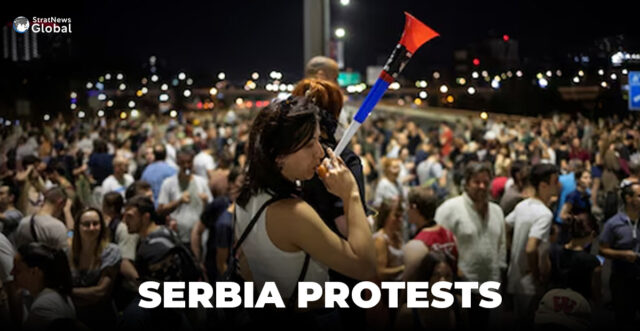The Kremlin said on Monday it could not dismiss the possibility that the anti-government protests in Serbia, a key Russian ally, might be part of an attempted “colour revolution,” but expressed confidence that the Serbian leadership would be able to restore order.
Serbian police on Saturday clashed with anti-government protesters demanding snap elections and an end to the 12-year rule of President Aleksandar Vucic.
“Despite the fact that Serbia is, of course, under unprecedented pressure – we cannot rule out that well-known methods are being used there to provoke colour revolutions,” Kremlin spokesman Dmitry Peskov told reporters.
“We have no doubt that the current Serbian leadership will be able to restore law and order in the republic in the very near future,” he added.
Russia has traditionally regarded Vucic as a close ally and the Serbian leader was in Moscow on May 9 to watch the Red Square military parade held to commemorate the Soviet victory over Nazi Germany in World War Two.
Months of protests across Serbia, including university shutdowns, have rattled Vucic, a populist, whose second term ends in 2027, when there are also parliamentary elections scheduled.
Widespread Protests Hit Serbia
Thousands of people took to the streets across Serbia in recent days, demanding snap elections and an end to President Aleksandar Vucic’s 12-year grip on power.
The protests, which have intensified in the capital, Belgrade, and other major cities, reflect growing public frustration over alleged government corruption, media censorship, and authoritarian tendencies.
Demonstrators waved Serbian flags and chanted slogans calling for Vucic’s resignation, accusing him of eroding democratic institutions and consolidating power in the presidency.
The protests were triggered by long-standing concerns over the state of democracy in Serbia, as well as dissatisfaction with the government’s handling of key social and economic issues.
Opposition leaders and civil society groups claim that under Vucic’s rule, Serbia has seen increasing repression of dissent, restrictions on independent media, and political favouritism. They are calling for immediate parliamentary elections and reforms to ensure fair competition and transparency.
‘Politically Motivated’ Protests
Vucic, who first came to power in 2012, has dismissed the protests as politically motivated, accusing opposition parties of attempting to destabilise the country.
He said unspecified “foreign powers” were behind the protest on Saturday and that protesters had been attempting to “topple Serbia” but had failed.
Despite the rising tensions, the Serbian president maintains strong support among sections of the population, particularly for his handling of economic development and foreign policy.
(With inputs from Reuters)





